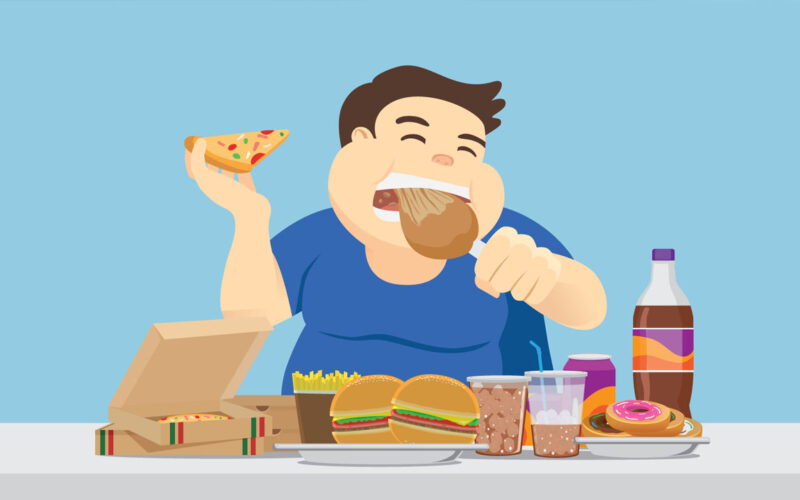Do you often find yourself eating without genuinely considering it? If yes, then you are not alone! Read on to uncover what causes us to eat mindlessly.
All of us have eaten mindlessly before. We may be snacking all afternoon or eating while watching TV. We’re busy people, so we can only sometimes eat mindfully every time, but mindless eating can have several unfavorable effects. Mindless eating never benefits us and can lead to binge eating episodes, feeling too full, digestive problems, regret, and guilt.
Continue reading to explore the common causes of mindless eating and learn how to stop.
What are the common causes of mindless eating?
You can more easily spot when you are mindlessly eating and take action to stop it if you have a better grasp of what causes it.
Comfort Eating
Food brings us joy because it tastes delicious. But, unfortunately, this could go down a slippery slope.
Food is fun and delicious, and thus, we should consume it as such! But what we don’t want to do is begin using food as a soother or a coping strategy to deal with another unpleasant aspect.
When someone eats to comfort themselves, they typically want to replace an unpleasant feeling with something happy. Let’s imagine, for instance, that you are tired after work. When you arrive home, you might find that you can’t quite shake your anxiety, so you grab your favorite chocolate cake since chocolate always tastes nice and will help you forget your stress. But, unfortunately, it results in mindless eating.
You don’t eat the chocolates because you want to do anything other than devour them and appreciate them for what it is! Instead, you’re seeking solace and escape in the chocolate, which may also happen because of nearly any intensified emotion, such as despair, rage, or frustration.
Environmental Indications
Do you need a bag of chips or caramel popcorn when you turn on the TV? That is nothing to be ashamed of to desire to enjoy a food merely since enjoyment is an essential function of food too.
Yet when we crave the food item though not hungry, this is where mindlessness enters the picture. We can’t pay attention to our hunger and satiety signals to choose how much and when to eat if we are delighted and only eat in response to external cues. So we’re just eating for pleasure, which frequently results in overeating, making us feel incredibly full, overstuffed, and possibly even a little regretful after consuming more food than we had planned.
Distractions
Another frequent reason for mindless eating is distractions. Distractions from your culinary experience include everything from Instagram scrolling to watching TV to working while eating.
When you need to pay attention to the food’s flavor and texture while preoccupied, it’s easier to feel content with your eating. Have you ever watched Netflix while snuggling on a comfy couch with a large bowl of chips? Before you knew it, you had consumed much more food than you probably would have had you seated at a table and paying attention to your meal.
Now, it’s crucial to understand that occasionally doing that is acceptable! For example, we may want a relaxing Netflix evening with some snacking. But, if this is a regular part of your daily routine, that is the time to work on breaking the habit.
Consuming mindlessly because of pressure from others
We all have been in situations when a friend or some relative pressured us to try some food. Hearing something like- “you have to try this even if you are full because it’s delicious” in a social setting, you can’t avoid eating it.
Mindless eating occurs when we consume food even though we aren’t hungry or don’t particularly like it. We’re eating once more just for food’s sake. We eat because someone instructed us to, not because we’re thinking about how good the meal tastes, how it feels when we consume it, or how it smells.
Eating out of boredom.
While comfort eating and boredom eating are similar, the latter is more habit-driven than the former. When necessary, our habits enable us to work automatically and finish daily duties quickly. The wonderful thing about routines is this! But they can also make us act carelessly or without thought around food.
Let’s take an example from your childhood. After doing homework, you always go to the kitchen instead of playing or doing anything else. You were drowsy. You developed the behavior of searching the cupboard and taking everything you could find.
So from now on, food might be the first thought that comes to mind when you’re bored. That became a habit.
Once more, we eat for a different need that the food item, sadly, cannot genuinely satisfy rather than because we are hungry and want to experience it actively.
Scheduled meals lead to mindless consumption
Many people must adhere to a specific meal regimen. People believe they must consume all the meals at set times each day.
Here, we again choose to ignore our satiety and hunger signs deliberately. We’re pushing the body to consume when we think we should eat rather than responding to the body and acting accordingly. Again, when we ignore how the meal makes us feel, we mindlessly consume food.
Conclusion
Above are some of the common causes behind mindless eating. You should investigate the reasons behind your mindless eating now that you know them. You can actively attempt to change bad habits and form healthier, new ones once you know what usually prompts you to eat mindlessly.

